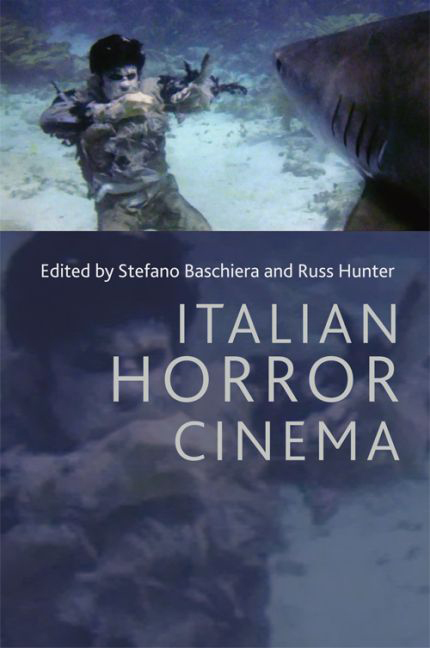Book contents
- Frontmatter
- Contents
- List of figures
- List of contributors
- Acknowledgements
- Introduction
- 1 Preferisco l'inferno: early Italian horror cinema
- 2 Domestic films made for export: modes of production of the 1960s Italian horror film
- 3 The 1980s Italian horror cinema of imitation: the good, the ugly and the sequel
- 4 Knowing the unknown beyond: ‘Italianate’ and ‘Italian’ horror cinema in the twenty-first century
- 5 Bavaesque: the making of Mario Bava as Italian horror auteur
- 6 The Argento Syndrome: aesthetics of horror
- 7 Scrap metal, stains, clogged drains: Argento's refuse and its refusals
- 8 The giallo /slasher landscape: Ecologia del delitto, Friday the 13th and subtractive spectatorship
- 9 Kings of terror, geniuses of crime: giallo cinema and fumetti neri
- 10 Political memory in the Italian hinterland: locating the ‘rural giallo’
- 11 The horror of progressive rock: Goblin and horror soundtracks
- 12 ‘The only monsters here are the filmmakers’: animal cruelty and death in Italian cannibal films
- 13 Italian horror cinema and Italian film journals of the 1970s
- Index
10 - Political memory in the Italian hinterland: locating the ‘rural giallo’
Published online by Cambridge University Press: 12 September 2017
- Frontmatter
- Contents
- List of figures
- List of contributors
- Acknowledgements
- Introduction
- 1 Preferisco l'inferno: early Italian horror cinema
- 2 Domestic films made for export: modes of production of the 1960s Italian horror film
- 3 The 1980s Italian horror cinema of imitation: the good, the ugly and the sequel
- 4 Knowing the unknown beyond: ‘Italianate’ and ‘Italian’ horror cinema in the twenty-first century
- 5 Bavaesque: the making of Mario Bava as Italian horror auteur
- 6 The Argento Syndrome: aesthetics of horror
- 7 Scrap metal, stains, clogged drains: Argento's refuse and its refusals
- 8 The giallo /slasher landscape: Ecologia del delitto, Friday the 13th and subtractive spectatorship
- 9 Kings of terror, geniuses of crime: giallo cinema and fumetti neri
- 10 Political memory in the Italian hinterland: locating the ‘rural giallo’
- 11 The horror of progressive rock: Goblin and horror soundtracks
- 12 ‘The only monsters here are the filmmakers’: animal cruelty and death in Italian cannibal films
- 13 Italian horror cinema and Italian film journals of the 1970s
- Index
Summary
This chapter aims to locate a sub-set of what has become known as the ‘giallo ’ filone within its historical contexts, and to ask what significance this relationship might hold for the broader study of Italy's cultural history. Such an under-taking immediately poses methodological questions: what are we looking for when we seek to identify ‘history’ in such popular cinema; by what models can we best pursue a ‘historical’ approach to an amorphous, frequently unruly cinematic format like the Italian filone? Certainly, such films can offer insights into how discourses about the past have been represented and consumed within particular registers of historical address. John Foot concludes his study of Italy's ‘divided memory’ by stating that, for the historian:
[Italy] provides a rich and complicated kaleidoscope of debates over the past. Our task is not to look for overarching theories or outcomes that suppress these competing visions and narratives, but to understand, explain, and study how the past has been experienced and narrated over time. (Foot, 2009: 206)
Foot's central thesis places the nation's history in an osmotic relationship with a contested ‘public memory’: a relationship that ensures that the past is continually constructed and narrated anew in the negotiated, organic shaping of the present. By thus repudiating perceived boundaries between notions of (empirical) ‘history’ and (subjective) ‘memory’, Foot seeks to examine heterogeneous ‘lived experiences’ of a people's relationship with their national past: analysing not mere ‘facts’, but the differing ways in which perceived facts have been understood and utilised (Foot, 2009: 5–6). In essence, this approach seeks to appraise ‘history’ on its audiences’ terms, to take account of the cultural options open to them for its interpretation and negotiation in a given moment.
Such an approach is brought into particular focus when we consider Italy's 1970s: a decade notable for schismatic preoccupations with the national past, which presents an array of cinematic registers through which such preoccupations were represented. Increasingly, scholarship in this area provides nuanced considerations of how popular formats engaged in historical discourse. Yet, where contextualisation within the specific political and historical conditions of 1970s Italy is concerned, gaps remain surrounding the diverse category of the giallo thriller.
- Type
- Chapter
- Information
- Italian Horror Cinema , pp. 160 - 174Publisher: Edinburgh University PressPrint publication year: 2016



